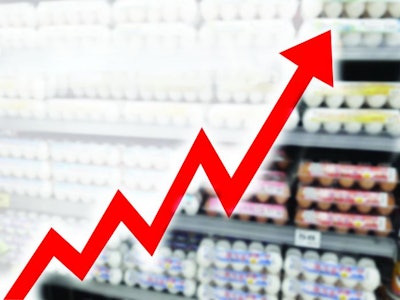
Egg prices are predicted to remain high in markets impacted by avian flu, high production costs and regulatory changes, at least throughout the end of 2023, according to financial services company Rabobank’s recent global egg price index.
“Rabobank’s global egg price monitor reached a new record in Q1 2023, with the index now peaking above 250, which means prices are 2.5 times higher than the reference year of 2007, and have increased more than 100% since this time last year,” said Nan-Dirk Mulder, Rabobank Senior Analyst – Animal Protein.
Operational costs to egg producers have grown
Because feed represents over half of a layer farmer’s costs, changes or uncertainty in feed costs directly impact egg prices and supply, explained Mulder.
In Feed Strategy’s 2023 Poultry Outlook report, Mulder previously explained that other operational challenges such as increasing energy and transportation costs, competing industries that require feed ingredients such as biodiesel and adverse weather conditions affecting crops will continue to escalate feed prices and impact producers as the year progresses.
“Although we expect slightly bearish corn and soybean prices, they will still be high from a historic perspective and taken its ongoing stock levels in a context of slow Chinese demand, geopolitical changes and potential supply disruptions, prices will be volatile,” Mulder stated.
Additionally, the ongoing Russia-Ukraine war adds uncertainty to the cost of feed.
Avian influenza continues to inflate egg prices
Highly pathogenic avian influenza (HPAI) outbreaks last year caused massive layer depopulations that are still heavily impacting egg supply and prices.
According to the U.S. Department of Agriculture’s (USDA) Animal and Plant Health Inspection Service (APHIS), over 43 million table egg layers were depopulated in the U.S. due to HPAI in 2022.
According to the World Organisation for Animal Health (WOAH), almost 17 million of Japan’s poultry, or 9% of its egg layers, were directly impacted by its current HPAI outbreak that began in October 2022.
While these countries, and many others, work to repopulate their lost flocks, egg prices will continue to remain inflated. As flocks return, Rabobank said prices are expected to slightly reduce in countries and regions that experienced extreme price peaks such as the U.S., Europe and Japan.


















